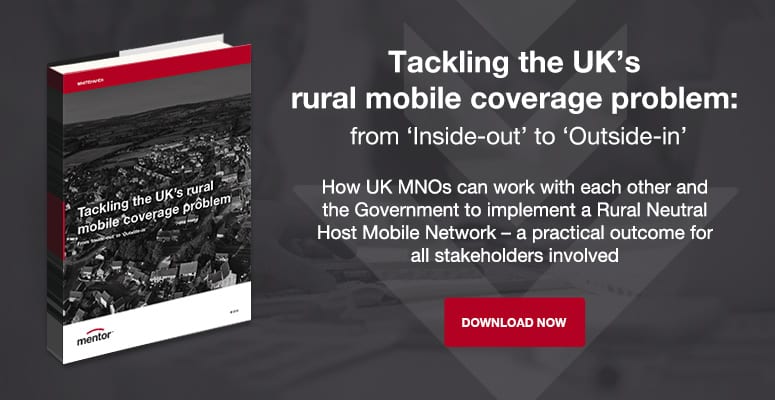Bikes, Buses and Broadband
Summary:
- Free-market economics will cause fibre-overbuild, where commercial returns are highest (perhaps 60-70% of homes). But not for fibre built in suburbs and rural areas (where free-market returns are marginal or negative). Government funding and intervention is clearly needed to drive full-fibre coverage.
- Mobile is a faster and more efficient first step in providing rural broadband coverage. A rural mobile service will pump up the economy and people’s lifestyles.
- It can be done more efficiently by a ‘neutral host’ building shared mobile sites, using all sub 1 GHz spectrum and offering a white-label fixed mobile broadband service through the MNOs.
- Overall costs can be dramatically reduced if mobile and fibre build-out are planned together.
- The government must intervene to manage road digging and other disruption caused by overbuilding.
Does anyone doubt Full Fibre Broadband is coming to the UK very soon?
It would be coarse to carp about our new PM’s enthusiasm for Full Fibre Broadband. After all, we’ve been campaigning for this for the last year or so.
But what is he offering, specifically? Is it money, moral support, barrier-busting – or just more bluster?
There is a range of helpful interventions the Government could make – but as always it depends on what problem he’s trying to solve.
At one level, it does feel like Boris is betting on a horse that’s leading the field and only a few yards from the finishing post.
Does anyone doubt Full Fibre Broadband is coming to the UK very soon?
There’s so much Full Fibre activity from the UK ALT.Net community – driven by a tsunami of cash from eager investors.
Even the gargantuan Openreach has finally woken up and is now sharing its own objectives to deliver millions of new Full Fibre homes.
But what’s the catch?
This cash will be ploughed into the usual postcodes, where network operators know that build costs will be dwarfed by service revenues. What’s more, given the well-known difficulties with forecasting, the most sought-after postcodes will be those where a strong return on investment is beyond doubt.
Without question, this will leave economically more difficult suburbs and rural areas out in the cold once again.
Let’s suppose Openreach’s scheme gets us to two-thirds of the population.
That’s the number BT used when it talked about its commercially viable Fibre to the Cabinet (FTTC) footprint – back in the day. It should be higher now given the experience it has gained with FTTC.
Is Boris talking about paying for what’s left?
Let’s hope so. After all, he’s said ‘everyone’ should have Full Fibre!
The cost of building this could be measured in £Billions, possibly £10’s of Billions, especially when we’re talking about covering more and more rural areas.
And it won’t be enthusiastic independent investors funding it this time. It will be the public purse.
A smart approach to building infrastructure
At Mentor, we think this is an essential, long-term goal for the UK. But a more urgent intervention is to solve the Rural Mobile Coverage Problem.
We strongly believe that in a setting inevitably constrained by both cash and skills, we should focus on extending mobile coverage first. Simply because this will have more impact on more people faster – and with less investment.
An integrated network and program design can accelerate the Full Fibre coverage in parallel with Rural Mobile – by actively planning to share many of the essential assets. Not least of which is the new fibre infrastructure.
So, the Government can usefully intervene in the rural fringe through funding. And by encouraging a smart approach to building infrastructure – that supports Mobile First – and lays the foundations for Full Fibre along the way.
What can the Government do in areas where investment is already underway?
Our main concern here is the practicality, disruption, and long-term sustainability of multiple independent fibre providers competing to dig the same roads. The same roads where BT and Virgin are already planning to upgrade to Gigabit infrastructures.
Late last year, we highlighted some of the lessons from the UK Cable TV debacle. At least, back then, the country was auctioned off in franchises avoiding the overbuilding problem.
It was interesting to see BT’s new executive team in Downing Street last week making the case for the sort of help they would like.
Apparently, they asked for help to get around local authority planning processes. They claim these processes are putting a huge drag on the network build process. Funnily enough, this is very similar to the ‘ask’ the Mobile Operators made in their negotiation with the Government to resolve Rural Mobile deprivation.
Minimising disruption on the streets
BT has asked for equal status to Gas, Water and Electricity utilities in being able to dig the road at times and places to suit their program needs.
Can anyone imagine the sheer chaos caused by 3 or 4 fibre providers digging the streets in the same way as Gas, Electricity and Water companies?
Should Government step in and provide some co-ordination in each geography – as well as some national technical standards – to aid the inescapable consolidation of fibre players? But perhaps that would go against popular free-market thinking.
Perhaps part of Boris’ horse-trading with BT could be focused on Duct and Pole Access (DPA) – one of our old favourites.
If BT Openreach is given higher digging status than anyone else, it could at least dig for everyone.
Perhaps by negotiating an effective set of service standards and obligations for DPA, we could make Openreach’s existing Ducts and Poles the preferred choice for independent Full Fibre Providers?
Not only would this reduce the disruption in our streets and avenues – but could go some way towards tackling the massive skill shortage all network builders face.
But let’s be clear, this job will not get done if everyone – whether Mobile or Fixed – continues to sit tight in their own stovepipe!


